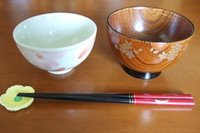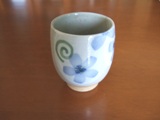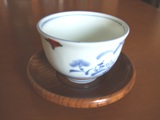MY tableware
Well, this idea has just occured to me; I think I will show you something unusual but might be interesting to you:
These are the Japanese-style tableware of my own that I actually use at my home everyday ;)
The right brown cup is "o-wan," in which I put miso(=fermented soybean paste) soup of my share. O is an prefix to express politeness, and wan means "cup."
Most o-wan's are made of wood and lacquered (like mine above), that is, japanware. The ones made of plastic covered with artificial lacquer are also popular.
The two sticks below the o-wan are my "hashi (pronounced like haa-she)," chopsticks. Japanese chopsticks used at meals are (artificial-) laquered wood ones. Mine above are 20cm (8 in.) long.
(You might have seen some joined chopsticks made of bamboo or thin bare wood. They are called "waribashi," meaning "split chopsticks," that are split apart to be used. They are the disposable ones, used in restaurants or coming with sold box lunch)
The left white cup is "cha-wan, " in which I put cooked rice of my share. Usually cha-wan's are ceramics(china) or pottery. (there are some plastic ones too)
Cha means "tea," wan means "cup," so cha-wan literally means " tea cup," but Japanese don't use cha-wan to have tea! Funny, huh? We use another kind of cups to have Japanese tea:


These 'tea cups' are called "yunomi (pronounced like you-know-me :) )" literally meaning "cup to have hot water with."
The left one is my own yunomi I use everyday; the right one is what I prepare for my guest.
The common size of these tea cups is around 7-8cm(3 in.) in diameter. They are china or pottery.
As I often mentioned above, Japanese usually have their own tableware at their home, o-wan, cha-wan, hashi and yunomi.
I have ever heard that this Japanese custom is surprising to people in Western countries. Is it true? Want to ask why Japanese have their own cups and chopsticks home? Well, I wonder why too! Contrary, why don't you have your own plates and knives& forks in your country if you don't?! :) :)
Now, how interesting the tableware difference is, isn't it?
You can buy those kinds of Japanese daily-use cups and chopsticks for several hundred yens (5-7 dollars) each. (high-class ones cost thirty, fourty or more dollars)
They are classified into men's, ladie's, kid's, and the size and design differ with each other; colors vary too.
When you visit Japan, why not try grabbing some for your own? ;)

4 Comments:
Well, I didn't know Japanese were having there very own tableware. (Somehow it's so impressive how different people live all over the world!) We don't have our own tableware in Switzerland. Our family just has a set of knives, forkes, spoons, plates... but it doesn't matter who uses which piece of cuttlery. Anyway I think it's a very nice thing to have your own tableware - it's more personal somehow - a special part of your culture I guess.
By the way, thanks for checking on my blog - I was really pleased to see your message!;)
Hmm...like I imagined, any piece of cuttlery is of anyone's. Of course Japanese have silverware home too; we eat soup (not miso soup)with a spoon, spaghetti with a fork, but we don't care whose the fork or spoon is. So yes, that might be a unique part of Japan's culture.
I've been a bit worried if you noticed my message on your post, but now glad to hear that :)
Tonight something funny came to my mind. In our family everyone actually has her/his own cup to drink tea or chocolate out of. It's not a crime if I use my sister's once but the yellow one just isn't mine whereas the red one belongs to me. Thought I ought to tell you...:D
Sounds interesting. It might be kind of a 'local rule' at your family :)
It is often only cups and chopsticks that Japanese have as their own; about silverware, dishes & plates, we usually share them with other family members; it's a bit funny :D
Speaking of dishes and plates, some of Japanese ones (even for everyday use) are potteries of special material, glaze, or bake, so they cannot resist heat or alkali or being soaked in water long (genuine japanware, too).
Many pieces of tableware sold in Japan, even casual ones, are often stated each if they are detergent, dishwasher, microwave or oven-proof. We have to take great care of our cups or plates...!
Post a Comment
<< Home